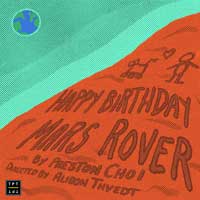
 Highly Recommended *****Incredibly imaginative! Supremely rewarding! You know you’re watching something great when the audience absolutely loves the performance. “Happy Birthday Mars Rover” is just that type of show. This six-actor play is a whimsical comedy that doubles as a tragedy and a warning to all human beings. It will have you laughing out loud throughout, while at the same time, it doesn’t beat you over the head with its central message.
Highly Recommended *****Incredibly imaginative! Supremely rewarding! You know you’re watching something great when the audience absolutely loves the performance. “Happy Birthday Mars Rover” is just that type of show. This six-actor play is a whimsical comedy that doubles as a tragedy and a warning to all human beings. It will have you laughing out loud throughout, while at the same time, it doesn’t beat you over the head with its central message.
Playwright Preston Choi is stellar in creating this sweet, smart script with its deep, dark undertow, namely this: Humankind is enamored with finding life on Mars and other planets. The names and functions of the Mars Rovers, Curiosity and Opportunity, reveal how—as a species—we are inquiring by nature and seek to explore the vast universe outside of ourselves. Yet at the same time, we disparage life here on earth. Mars may indeed be flourishing while the Earth is dying. The interspersing of the fifth graders’ science reports on species extinction becomes all the more haunting as the performance continues; for not only are the animals dying off, but soon human beings will do so as well. What would it be like to be the very last human being in existence on this planet? What would happen if practically all human beings die at the same time, or if the next few generations of people fail to reproduce themselves—either by choice, chance, infertility, lack of sexual desire, or lack of interest in having children?
The underlying theme is that smaller decisions of individuals, combined with individual differences in sexual orientation (e.g., gay/straight/queer), wind up affecting the whole of the human species. You may think that the ocean is vast and that you are but one drop of water (or one jellyfish or one discarded plastic straw) within. You may believe that your one life doesn’t matter regarding the survival of the entire human species—when, in fact, it does. And we need to preserve the oceans and our planet as a whole and our love for life in order for our entire race to survive.
Comedy and sex represent life with frank discussions of death permeating throughout. Why give birth to children in the first place if they are doomed to die at a future time? The finality of death is inescapable. But instead of morose contemplations that are funny by dint of their morbid content, it is through humor and imaginative action (and what you don’t see on stage) that brings the point home. Consequently, keeping relics and mementos of humans (like hair and teeth or ashes) in glass jars may become a tradition so as to remember all of us when we no longer walk the earth as a species. Painting a portrait of our last living descendants may become the only way to immortalize people when the entire race no longer exists.
Of course, playwright Choi makes the presumption that humankind is ultimately valuable and therefore worth preserving—and that all of us as a species really do want to live on in some fashion. It is a sad day to think that we will not, especially considering the direction that the world is moving (at least, according to Choi’s dystopian reality), yet the playwright creates hope in the potential revival of Curiosity, if not also Opportunity.
Director Alison Thvedt creates an intimate meditation on life in each of the 43 scenes of “Happy Birthday Mars Rover.” She deftly handles all the actors moving in and out of character constantly. With so many things happening from one  scene to the next, it is wise that an announcer provides the title for an individual scene in advance, or else there would be too much of a jumble.
scene to the next, it is wise that an announcer provides the title for an individual scene in advance, or else there would be too much of a jumble.
Certain vignettes are very reminiscent of improv, considering the silliness of being in the moment in combination with the lack of stage decoration and no fixed set. Several appear to be a hodgepodge of samplings of what life is, what it means to live, and what gives life its savor. The earliest of these seems to take place in the early 1960s, with the beginning of the space race. The last of these doesn’t have an exact date on it, but it’s probably at the end of the 21st century, when the grandchildren of twenty-year-olds today are the last of the human race. Though nearly impossible to keep track of all the seemingly disparate scenes, understanding that level of detail is not needed in order to comprehend the underlying story—and to see ourselves as being a part of it and the apocalyptic message that rings through at the end.
Over a hundred characters are depicted by the six actors—Sarah Lo, Vic Kuligoski, LaRose Washington, Cory Hardin, Liz Cloud, and Em Haverty, who are respectively listed in the program as Actors 1, 2, 3, 4, 5, and 6. What fantastic players! How easily they shift from one character to another! Even though so many characters are being defined, the fact that the same actor might play a similar role in different generations helps to tie the overall play together. The pantomime and imaginative display of a range of acting styles and word usage makes the production fun and its many elements unexpected.
 The uses of white umbrellas in various scenes is spectacular. What an inventive use of a shopping cart! The clever props are the work of Amelia Mroczkowski, who provides the means by which the laws of physics and logic are defied with humorous result. Charles Blunt does a fine job with the lighting as does Jos N. Banks with the costuming for this production. Sound design by Jonesy Jones and space design by Maiya Corral are appropriate to the various settings and nicely done. The projections and music were very well tailored to the story.
The uses of white umbrellas in various scenes is spectacular. What an inventive use of a shopping cart! The clever props are the work of Amelia Mroczkowski, who provides the means by which the laws of physics and logic are defied with humorous result. Charles Blunt does a fine job with the lighting as does Jos N. Banks with the costuming for this production. Sound design by Jonesy Jones and space design by Maiya Corral are appropriate to the various settings and nicely done. The projections and music were very well tailored to the story.
Just as the advance publicity described, Choi is a playwright to watch: He’s a talented young man destined to go places. In viewing the performance, you can tell he’s young, considering his perspective on life and the type of humor inherent to the story: ranging from the incidental to the contrived, with plays on words plus pantomime and the unlikely superimposition of various strands of numerous and sundry tales. Though greater sophistication will come with age, Choi has already mastered the complexity of the art, replete with its timing and focus. “Happy Birthday Mars Rover” is thus the happy result and portends a prodigious career ahead.
The only fault in the performance is leaving all those glass jars on the floor of the theater at the very end. I completely understand that the director is trying to make a point about the serious issue of human extinction, but the lawyerly side of my personality thinks this is very a bad idea. Perhaps the last human on earth could sweep up all the remains? Perhaps Curiosity could do so!
“Surprise me!” was my first thought when I learned about the world premiere of this production by The Passage Theatre. In fact, I was not only surprised but infinitely pleased. The play makes you think about what life is all about and helps make each and every one of us more thoughtful of why we have children (and grandchildren) or not. Is life all about each of us as individuals or as a species? Do future generations really matter—and if so why? What is life really about? Do human beings actually make a difference to our universe? And if so, how do we preserve what it really means to be human?
“Happy Birthday Mars Rover” is playing at the Ravenswood Fellowship United Methodist Church, 4511 N Hermitage Ave, Chicago, through December 2, 2019.
Tickets are $15 each and are available at https://www.thepassagetheatre.com/ or can be purchased in person at Ravenswood Fellowship United Methodist Church 30 minutes prior to the performance.
Performances are: Mondays, Thursdays, Fridays, and Saturdays at 7:30 p.m.
Please note: there will be two added performances on Sunday, December 1 at 3:00 p.m. and 7:30 pm. There will be no performances Thursday, November 28 – Saturday, November 30.
Street parking is available by the church. Note that there is a detour on Sunnyside (4500) about a block and a half west of Hermitage for work on the elevated tracks.
To see what others are saying, visit www.theatreinchicago.com, go to Review Round-Up and click at “Happy Birthday Mars Rover”.






More Stories
“Survivors” reviewed by Julia W. Rath
“Prayer for the French Republic” reviewed by Julia W. Rath ( and another by Paul Lisnek)
“Obliteration” reviewed by Mark Reinecke